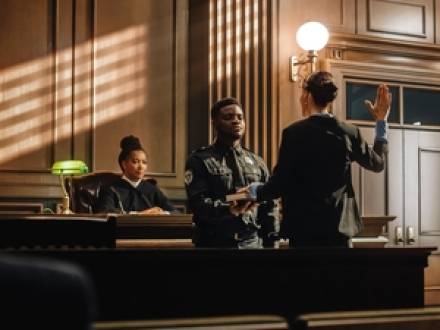2591 Dallas Parkway, Suite 207A, Frisco, TX 75034
Free Consultations
469-333-3333
 |
DO I HAVE TO GO TO TRIAL IN TEXAS? |
Types of Witnesses in Criminal Trials
 Witness testimony plays a crucial role in criminal trials. Whether testifying for the prosecution or the defense, witnesses provide information that helps the court determine what happened and whether a defendant is guilty.
Witness testimony plays a crucial role in criminal trials. Whether testifying for the prosecution or the defense, witnesses provide information that helps the court determine what happened and whether a defendant is guilty.
However, not all witnesses do quite the same thing. Understanding the different types of witnesses in a criminal trial can help defendants and their attorneys build a strong defense. A Texas criminal defense attorney will need to look at your case to determine whether witnesses might support a favorable outcome.
Fact Witnesses
A fact witness is someone who has direct knowledge of the events related to the case. This person may have seen, heard, or experienced something relevant to the crime. Fact witnesses include eyewitnesses, bystanders, and victims. Because fact witnesses are often influenced by stress, personal bias, and their physical point of view of events, they are not always the most reliable witnesses.
Expert Witnesses
An expert witness is a professional with specialized knowledge in a field relevant to the case. Unlike fact witnesses, expert witnesses do not testify about what they saw or heard. Instead, they offer opinions based on their expertise. Common expert witnesses in criminal trials include:
-
Forensic scientists – Experts in DNA analysis, fingerprint identification, and toxicology who explain physical evidence
-
Medical examiners – Pathologists who determine the cause and manner of death in homicide cases
-
Psychologists or psychiatrists – Professionals who assess a defendant’s mental state or competency to stand trial
-
Accident reconstructionists – Specialists who analyze car accidents to determine how they happened
Because expert testimony can be technical, attorneys often question experts about their credentials and methods to ensure their findings are reliable.
Character Witnesses
A character witness testifies about a defendant’s personality, reputation, and behavior. These witnesses may include friends, family members, coworkers, and community members who know a defendant and can say either good or bad things about them.
Police Officers and Investigators
In many cases, police officers or detectives testify about their investigation. They may describe the series of events leading up to an arrest, the arrest itself, how they collected evidence, and more. Police officers usually testify against a defendant, but a defense attorney may challenge law enforcement testimony by questioning whether the officers followed proper procedures. If evidence was collected illegally or a confession was coerced, the defense may seek to have that evidence excluded from trial.
The Defendant as a Witness
Defendants have the right to testify in their own defense, but this decision carries risks. If a defendant chooses to testify, the prosecution can cross-examine them and highlight inconsistencies in their statements. In some cases, a defendant’s prior criminal record may be brought up in court. A defense attorney carefully considers whether testifying will help or hurt the case.
Contact a Frisco, TX Criminal Defense Attorney
If you are facing criminal charges, having the right witnesses can make a significant difference in your case. A Collin County, TX criminal defense attorney at Law Offices of Biederman & Burleson P.L.L.C. can analyze the evidence and identify witnesses who could strengthen your case. Call 469-333-3333 today to schedule a free consultation.


 600+ DWI & CRIMINAL DEFENSE TRIALS
600+ DWI & CRIMINAL DEFENSE TRIALS
















